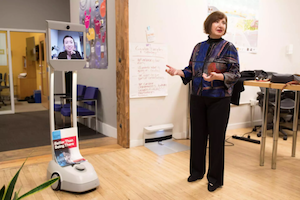Future Now
The IFTF Blog
“The current form of inequality has not existed for one hundred years"
World News
"The current form of inequality has not existed for one hundred years" - HS correspondent Heikki Aittokoski traveled to Silicon Valley to find out whether there is a nightmare or a better world in our future.
Changes in the concept of work will radically change the whole society, says future researcher Marina Gorbis.

Director of The Future Research Institute IFTF Marina Gorbis introduces the Telepresence device, which can be controlled by a person in another city and use it to attend meetings.
(PHOTO: KALLE KOPONEN / HS)
Heikki Aittokoski HS
Published: 20.2. 2:00, Updated: 20.2. 6:46
THE QUESTION is, of course, childish, impossible to even answer, but must it still be asked: are we on the road to a better future or a nightmare?
"Every utopia contains dystopian seeds," says Marina Gorbis.
We are in the heart of wealthy Palo Alto, California, in Silicon Valley. Here Gorbis leads the IFTF research institute. The abbreviation comes from the name Institute for the Future and, like its name entails, the department is mapping out the future guidelines.
Gorbis' phrase makes you ponder the subject. Utopia and dystopia are often heard words when judging the future of mankind.
Utopia is originally a book written by an Englishman Thomas More 500 years ago. For a long time, the word has referred to an ideal society. Often utopia is referred to as a dream, unreachable bliss.
Dystopia, on the other hand, is the opposite of utopia, a failed society in which human beings are suffering in.
REALITY tends to be between the utopia and dystopia. That's what Gorbis also means.
“In the best case, we somehow manage to go our way through the present" Gorbis says. "I do not think anyone has all-encompassing solutions."
Basically, nowadays there are more tools than ever before to anticipate the future. The amount of data keeps exponentially increasing.
"The more data we have available, the better we can predict the success of a product launch or election results for example,” Gorbis says.
"But no one can actually predict the future. Broad-scale societal changes are too complicated, there are so many variables.”
Instead of forecasting, Gorbis and her colleagues attempt to perceive large changes and the forces behind them. What are they then?
"The biggest thing going on is the change in work and jobs - a very fundamental one" Gorbis says.
A sign at the Future Research Institute’s entrance at Palo Alto in Silicon Valley: "I will make the future.” (PHOTO: KALLE KOPONEN / HS)
IN SILICON VALLEY the transformation of work is already reality. Of course, it is linked to the breakthroughs in technology.
Traditionally work has meant permanent employment relationships. In the US, the classic example is General Motors' automotive worker. The duration of the employment relationship could be relied on, and the permanent work has brought health insurance and retirement benefits to the worker.
In the new gig economy safety nets disappear. Gorbis mentions Uber and Upwork, both of which hail from Silicon Valley.
Uber has made major changes to the taxi industry in the cities of the United States, and in Finland it is also on everyone’s lips. Drivers drive their own cars, and if the customer needs a ride, he will call for the closest free car with Uber's smartphone application.
Upwork on the other hand is a kind of job marketplace on the Internet. Employers and freelance workers meet, and the latter may end up getting some work.
"Uber drivers do not have personnel benefits such as occupational health care. They also have no one to call to if something goes wrong.”
MARINA GORBIS speaks of undercurrents and waves. The continuous development of technology is the undercurrent, and companies such as Uber and Upwork are visible manifestations on it, waves.
The undercurrent is strong. Technology allows for ever-extending versions of so-called platform economies: Internet services where customers and companies or employees and employers find each other.
"Systems are constantly getting better” Gorbis says. Therefore, those who need and those who offer can be brought together in more detail.
This means that Uber and Upwork are just the beginning.
“There is a gap between what technology brings and how our society is structured.”
Watch an animated video that explains the development of technology from 1989 to today:
Heikki Aittokoski: Maailman lähihistoria kahdessa minuutissa
GORBIS says that it is worrying if the financial system offers abundance to few and low-paid gigs for more and more people.
"The current form of inequality has not existed for one hundred years."
This is about wealth above all, Gorbis says: the wage level remains unchanged, and all the profits go to people who already have assets, such as shares, land and real estate.
"It is obvious why the country [the United States] is in turmoil. More and more people do not benefit from globalization.”
EVEN IF income of the people was to increase, the growth of income difference causes dissatisfaction according to Gorbis - even with the prosperous people.
People do not position themselves in relation to what their own life was like 20 years ago. People think about the present and their position in relation to others.
"The comparison points are constantly getting worse. If Jeff Bezos’ wealth is one hundred billion dollars, it will suddenly become a new milestone."
Jeff Bezos is the founder of online retail giant Amazon and the richest man in the world.
According to Gorbis, income distribution plays the key part when the world is searching for its direction between utopia and dystopia. Of course, the changes in work are not just something for the United States.
Gorbis believes that the Nordic model offers protection from turmoil.
"Frankly, I think that Europe and Finland have it better than the United States because your social security network is stronger.”



